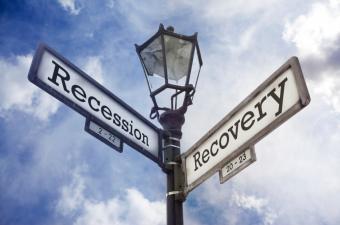""President Obama"":http://www.whitehouse.gov/ spoke to the nation Monday--one day after the five-year anniversary of the Lehman Brothers collapse that kicked off the financial crisis--to tout the progress the country has made and to urge Republicans to action as a potential government shutdown looms.
[IMAGE]In his speech, the president recapped the losses following the 2008 crash and noted the recovery the country has seen under his administration, pointing to improvements in employment and housing trends.
The bigger topic, however, was the budgetary debate happening in Washington, which has some GOP members saying they won't support any measure that doesn't defund the Affordable Care Act. For those members, Obama took a hard line.
""Congress' most fundamental job is passing a budget. And Congress needs to get it done without triggering another crisis, without shutting down our government, or worse--threatening to not pay this country's bills,"" he said. ""[I]n case there's any confusion, I will not negotiate over whether or not America keeps its word and meets its obligations. I will not negotiate over the full faith and credit of the United States.""
The president wasn't the only person to mark the occasion--many other current and former government officials and analysts offered their own commentary on the country's circumstances, and not all of it was as charitable.
[COLUMN_BREAK]Speaking at an event in Texas, ""FDIC"":http://www.fdic.gov/ vice chair Thomas Hoenig pointed out that conditions on Wall Street still resemble those before the crash.
""Now, five years after the crisis, we should not ignore that many of the conditions that undermined the economy then still remain in our financial system. These conditions include: a few dominant financial firms--those that are too big to fail--controlling an ever greater portion of financial assets within the US; continued government protections and related subsidies; and the continued reliance on a business model with its heavy use of debt over equity and increased risk in the pursuit of higher, subsidized returns on equity,"" Hoenig said.
While the Dodd-Frank Act does include many regulations designed to create greater oversight, he noted that the laws ""mostly reiterate long available to supervisors"" while failing to address industry structure and incentives that govern firms' behavior.
""Thus, in comparing today's financial system to that of 2008, I worry that the industry is more concentrated, that the system remains vulnerable to shock, and that the economy remains vulnerable to crisis,"" he said.
On the industry side, ""NewOak"":http://www.newoak.com/ president and co-founder James Frischling echoed that concern, offering statistics showing that the six largest banks now have 67 percent of all assets in the U.S. financial system. Size, however, isn't the only safety issue at play.
""Money flows are also incredibly important, so the plumbing in the financial system or what is referred to as 'repo market' can't be disrupted,"" Frischling explained. ""The disruption of the funding market contributed mightily to bringing Wall Street's problems to Main Street and there's concern that little has been done to regulate or make meaningful changes in that area of finance.
""For our system to truly be considered safer, more focus needs to be paid to the pipes that keep the capital flowing,"" he finished.

 theMReport.com Your trusted source for mortgage banking news
theMReport.com Your trusted source for mortgage banking news









